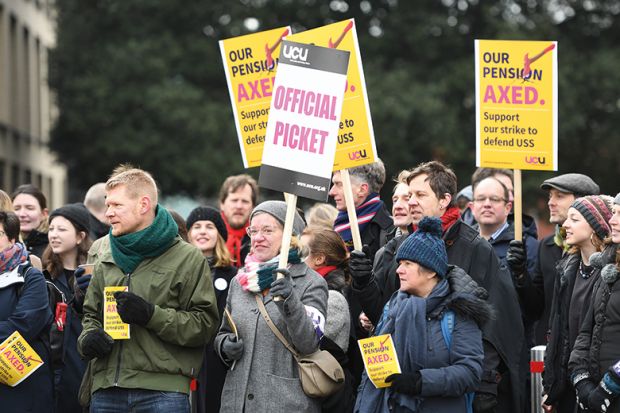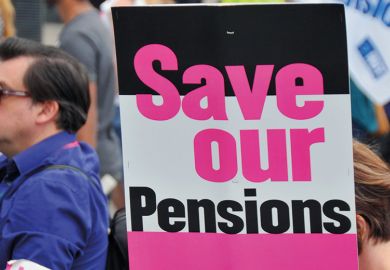Tuesday will be the fourth day of strike action in half of the country’s universities over pensions.
And Tuesday will be the day when the two sides – Universities UK for the employers, and the University and College Union – meet to discuss options.
There will be no resolution then. If there is a breakthrough, that will have to be formally discussed in the pensions machinery through the Joint Negotiating Committee [which comprises university and UCU representatives].
But there are four vital moves that can be made that could take us all further forward towards the resolution to this strike and the achievement of the two goals that everyone shares: the maintenance of a fair and sustainable pensions scheme and the full delivery of education and assessment for all of our students.
First, we need new ideas that allow the defined benefit (DB) scheme to continue in practice as well as in theory. The two sides have met many times over the past 18 months, culminating in a split vote in the JNC on the one standing proposal left – which is the one that the strike is about.
The onus is therefore very much on UCU to bring forward a series of new proposals: on the valuation process and assumptions, on the level of DB that can be afforded, and on what this might mean for strike action. I believe UCU have ideas, and now is the time to share them as proposals.
Second, UUK’s position is that the time is almost up; that there is a statutory process for the timeline running out this June. If there is the possibility of progress with a new proposal, we would need to see both sides engage with the Pensions Regulator about the timelines.
Third, I would like to see both sides commit to discussions about the future of the pensions scheme beyond this dispute particularly around risk sharing. For the longer term, the joint UUK–UCU agenda could include learning from the Royal Mail pensions process, which promises a novel approach with a collective defined contribution scheme, something that could be valuable to for that element of USS that is currently in DC mode; separately, it could also include employers committing to longer term guaranteed levels of contribution.
And fourth, I would like to see both sides approach the government about the possibility that USS becomes government backed. One reason for the current situation is that there is more risk around the future of universities since the government introduced the Higher Education Act (still less than 12 months ago) with its focus on "market exit" – universities becoming bankrupt. The Higher Education Funding Council’s mission was there to avoid such a possibility. The new Office for Students has no such responsibility.
Risk is higher, as USS is a "last man standing" scheme. If USS becomes government-backed, such concerns are significantly mitigated.
Half the countries’ universities are not striking; their staff are not in USS, but the Teachers Pensions Scheme, which is government backed. Sir Vince Cable lent his voice to the proposition on Saturday. And for the government, facing the costs of Brexit, some £60 billion would move into their assets, were this to be pursued.
This is a big week in this dispute; all want resolution; and the above is an agenda to take us all forward.
Stuart Croft is the vice-chancellor of the University of Warwick
Register to continue
Why register?
- Registration is free and only takes a moment
- Once registered, you can read 3 articles a month
- Sign up for our newsletter
Subscribe
Or subscribe for unlimited access to:
- Unlimited access to news, views, insights & reviews
- Digital editions
- Digital access to THE’s university and college rankings analysis
Already registered or a current subscriber?







